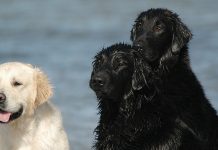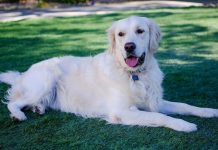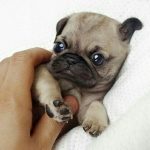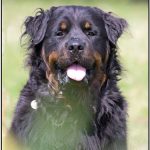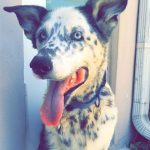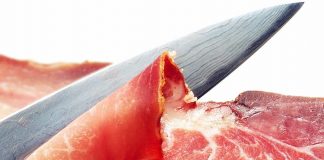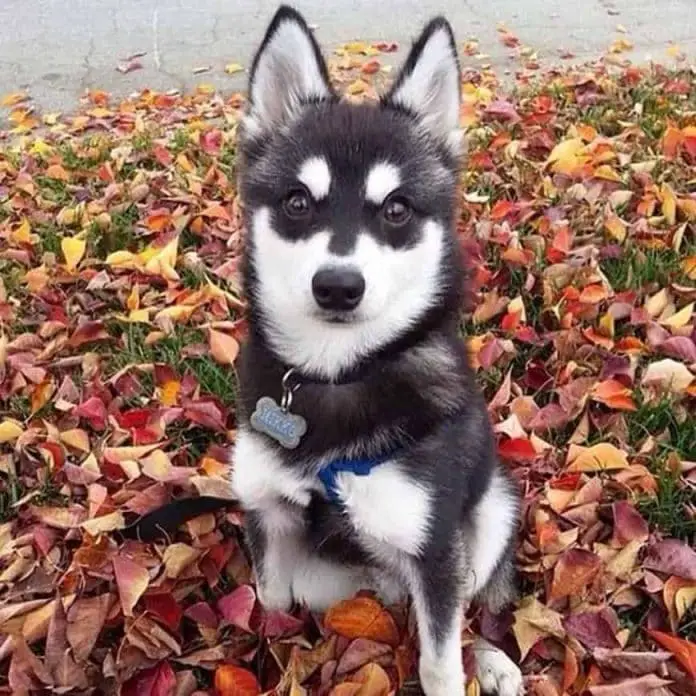
The miniature husky or simply the mini husky is not a stand-alone breed. It’s a Siberian husky bred to be smaller than the standard. If you’re a first-time pet owner who badly wants a Husky, find out if its miniature version will work for you.
History
Bree Normandin, a breeder from Asheville, North Carolina is the original developer of the mini Huskies. She first bred these dogs back in the 1990s. Her love for all things miniature led her to breed some of the cutest things on the planet, the mini Huskies.
Recognition
Breeding a miniature version of a Siberian husky is not illegal but it is not recognized as a specific breed or variety of dog. The Siberian Husky Club of America and the American Kennel Club recognize that the height requirement of this breed, which is 20-23 inches at the withers, depicts a functional working sled dog.
Accordingly, dogs that do not conform to the breed standard may not perform like they are supposed to. These organizations believe that any significant variation from these height requirements cannot function as a proper working sled dog and thus cannot be considered an acceptable Siberian husky.
Appearance
The appearance of a mini husky may vary but they should have proportioned weight and height. Any husky standing at 16 inches or below when fully grown is considered a miniature. On average, it weighs 18-35 lbs. The female ones are usually smaller than the males.
The miniature version of Siberian Huskies may come in a range of coat colors. Like a typical husky, they may be a combination of black and white, wolf-grey, pure white, agouti, and copper or red.
The eyes, which are either brown or blue and almond-shaped, add to the dog’s expressive look. They are born with triangular floppy ears which become erect as they grow older. They have the same wolf-like appearance as other Huskies except that they are more compact in terms of size.
The mini husky should not be mistaken for an Alaskan klee kai, which is a breed of dog originally made as a companion-sized version of the Alaskan husky. The mini husky looks a lot like the miniature Alaskan klee kai but it does not have all the features of the latter like the mask or the bands of color surrounding the eyes down to its nose.
Personality
Mini Huskies can be as friendly, energetic, and playful as a standard Siberian husky. If well taken care of, they will have a good temperament that will make them a perfect addition to your family. They are friendly not just toward their humans but also with other people who are not usually part of their circle.
Just be cautious in letting them play with other pets. These dogs may have an intense predatory drive. The undomesticated ones normally hunt small animals in the wild for food. While it’s unlikely to happen in domesticated Huskies, supervision is still important when letting your buddy socialize with smaller pets.
In general, Huskies are known for their free-spirited nature. You can’t expect them to be clingy most of the time but they will remain loyal to you as long as they feel secure while being in your company. To these dogs, their owners are the leader of the pack.
Grooming
Like their bigger counterparts, mini Huskies do not require much bathing but need weekly brushing to minimize shedding. They go through blowing of the coat or seasonal shedding just like any double-coated breed.
Seasonal shedding occurs to prepare your husky’s coat for the warmer weather. New hair grows in after the mini husky loses clumps of its undercoat. Expect this to happen twice a year, usually during the spring and the fall. It can last for a few weeks or longer depending on your husky’s health and age.
A sudden outburst of shedding in a miniature husky bitch can be caused by hormone changes experienced throughout pregnancy. If it’s accompanied by sudden weight gain, enlarged nipples, vaginal discharge, and fatigue, meet your vet to know how to prepare your pup for pregnancy. The intense shedding may also occur after neutering or spaying in dogs.
While there is nothing you can do to stop the heavy shedding, there are things you can do to keep it under control. Invest in an undercoat rake and a wide-toothed comb for the guard coat. Follow the brushing with a quick blow-drying to completely get rid of loose hair.
You’ll find that brushing is essential during the winter months because your mini husky’s coat will be prone to mats during this time. Don’t forget to brush in the direction of growth and to be as gentle as possible. Be extra careful when brushing the dog’s sensitive parts of the body like the groin and the back of the ears.
Bathing a mini husky may be easier than bathing a standard husky, but it does not mean you can just give it a full bath whenever you want to. Remember that your mini husky is just like any Siberian husky that does not have a typical dog smell. Apart from that, Huskies are generally good self-cleaners.
Feeding
Your mini husky will thrive on a high-protein diet. Adult dogs only require 18% of protein in their diet but because Huskies use a lot of energy, their diet may contain up to 30% of protein per day. The best protein sources are high-quality meat products.
If you’re feeding your pet commercially prepared dog food, check if the source of protein is clearly identified. Good choices for the main ingredient include chicken, beef, and lamb. Stay away from meat by-products or fillers. These ingredients do not have sufficient nutritional value to support a dog’s needs.
Avoid dairy products because these are the common triggers of allergies in dogs. A few Huskies can tolerate dairy but only low-fat or organic Greek yogurt. A husky with a sensitive stomach should avoid dairy at all costs. Apart from dairy, dogs prone to allergies should not be fed corn, wheat, and soy.
Like standard Huskies, the mini ones may eat human foods but better be careful with your choices. Also consider the fact that Huskies are not gluttons. Many of them are actually quite picky and are not likely to suffer from obesity.
Still, it’s an owner’s responsibility to keep an eye on a dog’s diet. Avoid overfeeding and make sure your mini husky gets the right amount of exercise he needs per day.
Make sure to keep your mini husky well-hydrated at all times. These dogs can tolerate any weather but they need lots of water, given that they are very active dogs too. A good rule of thumb is at least 8 ounces of water for every 10 lbs. of body weight. So, if your mini husky weighs 20 lbs, he needs to drink at least 16 ounces or half a liter of water each day.
The best thing you can do is to work closely with your veterinarian when formulating your mini husky’s diet. The amount of food miniature dogs need may be completely different from standard dogs because they have different activity levels and size.
Exercise Needs
Huskies are usually bursting with energy and they enjoy running, jumping, and climbing. It helps to have a secure place for them so they cannot easily escape. Remember, Siberian Huskies are best known for their ability to run away. Given the fact that mini Huskies have a smaller built, it is needless to say they will be better escape artists than their bigger counterparts.
A 15-minute walk twice a day, or even a bit longer, will be enough to keep his joints healthy. You may also consider other activities that will help your husky burn off his energy. It can be a simple game of fetch or a tug of war, which you can do in the backyard.
Playing with your dog will not only keep both of you healthy. It’s also an opportunity to bond with your mini husky and get to know him even more. Because Huskies are intelligent dogs, you may also introduce dog puzzles to stimulate your pet’s mind.
Health
A Siberian husky is a fairly healthy breed and this also applies to the miniature version. On average, they live up to 12-15 years. However, they can suffer from any health issues any dog would be at risk for. Keep an eye for the following health problems and issues often associated with huskies.
- Follicular dysplasia – this hereditary condition resulting in extreme hair loss happens when there are hair follicles with structural abnormality. In Siberian Huskies, it typically occurs from three to four months of age. Their guard hair may become reddish or may they may progressively lose it. There is no cure to this condition but a vet may prescribe emollient shampoos and oral melatonin to reduce the symptoms like skin redness, itching, and hair loss.
- Hypothyroidism – a miniature with this condition is not capable of producing enough of the thyroid hormone called thyroxin. This hormone controls your pet’s metabolism. This results in sudden weight gain, hair loss, and vulnerability to other skin problems. It can cause discomfort, so your dog may become aggressive or fearful. If these signs are all present, schedule an appointment with your vet to diagnose and treat hypothyroidism accordingly.
- Eye problems – glaucoma and cataracts are two of the common eye conditions associated with Siberian Huskies. Arctic breeds like Huskies are prone to primary or hereditary glaucoma which occurs when the fluid in your husky’s eye doesn’t drain properly. Cataracts do not hinder a husky’s vision as much as glaucoma, but it should be treated immediately otherwise, it may result in total blindness.
Mini Husky Mixes
The miniature versions of Siberian Huskies are sometimes paired with other breeds such as the Corgi, Pomeranian, Poodle, Dachshund, Pug, and Golden Retriever.
A mini husky pup developed by an authorized breeder may cost between $1200 and $1600. The price can go higher depending on the coat colors you prefer or the quality of breeding. Mini Huskies mixed with other breeds are usually pricier and may cost $2000 or more.
Where to Find Breeders
A simple Internet search will show you a number of breeders listing mini husky for sale. However, you can only count on two hands the number of breeders authorized by the Miniature Siberian Husky Club of America. You may want to check their website or official social media accounts to confirm which sellers are endorsed for breeding.
The club stated that their breeders want to ensure that the Miniature Siberian Husky is bred accurately, with dogs being health-tested and examined to guarantee consistency with the standard.
A reliable breeder will prioritize the well-being of the husky above all else. If you can no longer provide the dog the care it deserves, the breeder may request to have it returned. Some breeders even state this in their contract. If you have children, the breeder will also ask if they were taught how to handle and treat the puppies properly.
The breeder should review your capability of owning a dog and should not just give out the pup for the sake of gaining profits. They may ask about your history of having a dog to gauge your pet parenting skills. If it’s your first time, don’t hesitate to ask questions. A breeder should welcome any subject as long as it will benefit the pup.
Conclusion
Owning a miniature dog can have its pros and cons so better weigh these first before deciding to get one. If you haven’t owned a dog before, consider other breeds that are less determined or less tough as a Siberian husky.
Mini or not, Huskies, in general, are gentle can be as fierce as they look. Miniature Huskies may appear easy to care for due to their small built but they still have the big personality of a standard husky.




